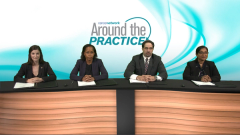
MAIA Trial: DRd vs Rd in Transplant-Ineligible Patients with MM
Leyla O. Shune, MD, reviews the MAIA trial, which looked at DRd vs Rd in patients with transplant-ineligible multiple myeloma.
Episodes in this series

Transcript:
Al-Ola Abdallah, MD: We have to put this into consideration that we have several trials for transplant-ineligible patients. I know there’s [debate] about these patients. Some of them are fit for transplant, so why didn’t we do that? But the MAIA trial may be a successful example of a randomized trial that they compare daratumumab-lenalidomide-dexamethasone with the previously known lenalidomide-dexamethasone that was the standard of care. Care to give us information about your opinion about the MAIA trial in terms of the benefits, response rates, and PFS [progression-free survival]? And recently, the overall survival that we need to talk a little bit about.
Leyla O. Shune, MD: MAIA is a phase 3 trial looking at people who are transplant ineligible. In this study, they take the previous standard of care, lenalidomide-dexamethasone, vs daratumumab-lenalidomide-dexamethasone. And this study has really changed the landscape of treatment for transplant patients because of the PFS [shown] at the 4-year update that was shown at ASH [American Society of Hematology Annual Meeting]. This study showed superior PFS, and the median overall survival had not been reached, indicative of an overall survival advantage compared with the standard of care lenalidomide-dexamethasone.
So for most people who are transplant eligible, the new standard of therapy is daratumumab-lenalidomide-dexamethasone based on the MAIA trial. Our previous standard used to be either lenalidomide-dexamethasone or bortezomib-lenalidomide-dexamethasone-lite [VRd-lite]. And that lite is a fallacy because older patients cannot handle bortezomib. They have a horrible neuropathy, imbalance, falls. The small [amount of] dexamethasone in VRd-lite can also cause problems with diabetes. So the field is now moving toward a dexamethasone-free regimen for older people, which was also presented by IMF [International Myeloma Foundation] at the recent ASH. But as of now, we have shifted en masse to daratumumab-lenalidomide-dexamethasone for transplant-eligible patients at our center.
Transcript edited for clarity.
Newsletter
Stay up to date on recent advances in the multidisciplinary approach to cancer.






































